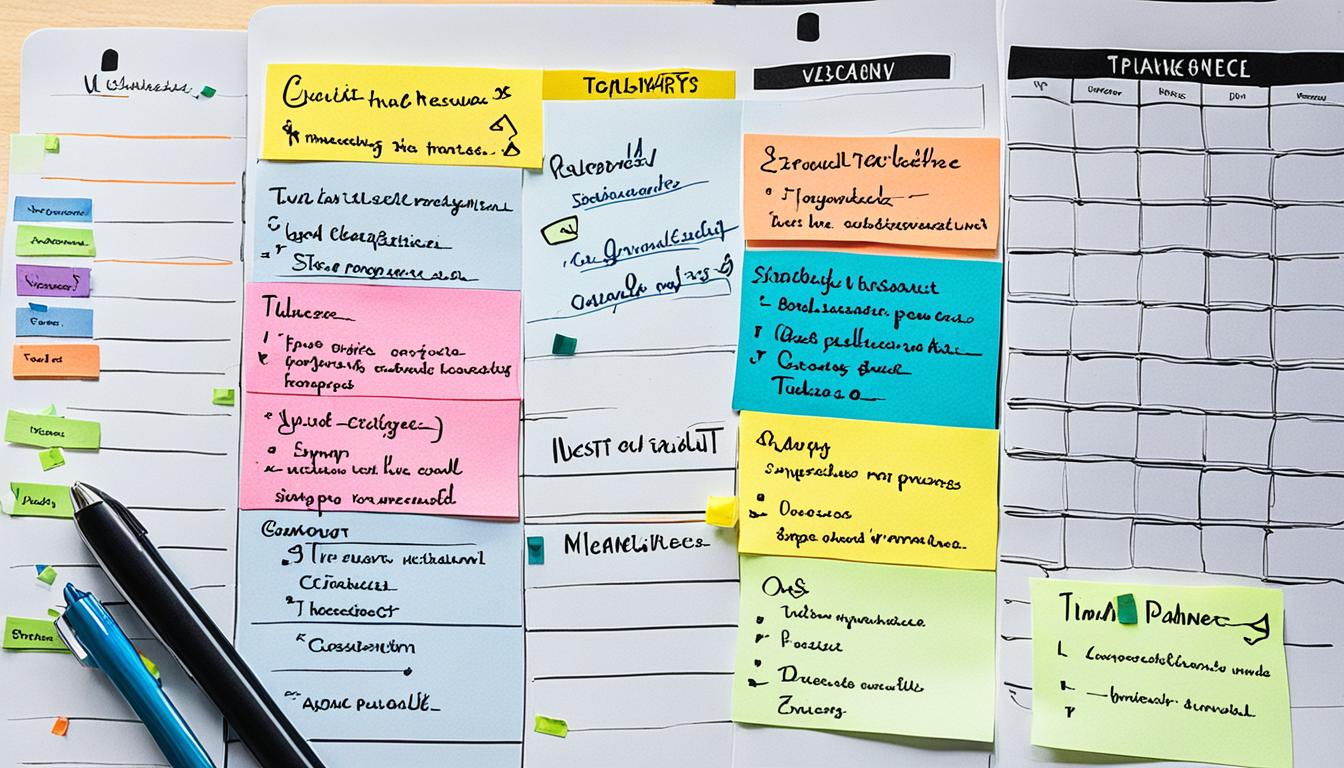Weekly planning is key for businesses that want to grow. It helps use resources well. By planning carefully and using software for managing resources, companies can hit their targets better and last longer.
Writing down business plans can make growth 30% more likely. And, documenting these plans can increase success by 42%. This is vital for companies looking to do well over time.
For project managers, weekly planning is a must. It matches skills with tasks, making teams work better and happier. This way of planning is key for using resources well and doing well in projects. For example, Target aims to make all its private-label products sustainable by 2040.

Key Takeaways
- Proper planning can optimize resource allocation within organizations.
- Documenting goals and plans significantly increases the odds of successful execution.
- Effective planning leads to an exponential increase in the probability of achieving a goal.
- Intelligent resource management software can enhance efficiency and adapt to changing demands.
- Weekly planning reduces stress by outlining clear action steps for teams.
- Writing down goals can enhance creative thinking and problem-solving skills.
- Strategic planning inspires and motivates employees to achieve higher goals.
Introduction to the Importance of Weekly Planning
Weekly planning is key to linking daily tasks with a company’s big goals. It acts as a guide for project managers. This helps them use resources well and finish projects on time. By planning well, projects can adapt to many tasks at once.
Overview of Weekly Planning
Weekly planning is vital for managing projects well. It helps organize tasks and roles. A PMI survey found 26% of companies with good planning can finish projects on time.
This planning makes teams work better together. It makes them more productive and happy.

Impact on Strategic Goals
Good weekly planning helps reach big goals. Gartner says knowing what resources you have and need is key. This helps use resources well and make the most of them.
Companies that manage resources well finish projects on time and within budget, says Deloitte Global Cost Survey 2020.
Making smart resource choices helps plan better. This leads to finishing projects on time and keeps employees happy by avoiding too much work.
Benefits for Project Managers
Project managers gain a lot from good weekly planning. It helps manage resources well, cuts costs, and boosts productivity. For example, Saviom Enterprise Resource Management software helped complete more projects with fewer technicians.
Tools like Gantt Charts and Workload Charts help managers use resources better. This leads to better project results and a place that encourages new ideas, says PwC Project Management Insights.
Learn more about the advantages of good resource planning and its effect on success in different fields.
Better resource planning means smoother project work. It lowers the risk of failing due to not having enough resources. It also keeps projects in line with company goals, leading to success.
Make Project Development Flexible
Adding flexibility to project development is smart. It’s done through weekly planning. This way, we plan resources well and manage many projects smoothly. It helps in delivering projects on time across different tasks.
Handling Multiple Projects Smoothly
Managing many projects well means using resources wisely. Emily Feliciano at Atlassian looks at up to 60 requests a week. She picks projects based on their value, urgency, and cost. At Scholz & Friends, Maike Jahnens leads a team of over 200 people. She uses tools to plan projects and share resources well.
Good resource management means:
- Choosing projects that make more money.
- Planning when people work to meet deadlines and stay on budget.
- Looking at who can do the work best without using them too much.
- Talking often with the team and others to make better choices.
Actionable Steps to Create a Project Plan
To make a flexible project plan, follow these steps:
- Define Stakeholder Roles: Give everyone clear jobs to avoid mix-ups.
- Budgeting: Spend money as needed and within limits.
- Set Objective Priorities: Know which tasks are most urgent and valuable.
- Collaborative Tools: Use apps to help the team work together better.
Checking and adjusting plans often keeps goals in line with what we can do. This helps avoid problems and lets managers quickly adapt to new needs. By doing this, businesses can make project development flexible. They can work on many projects without losing quality or missing deadlines.
ManagersResponsibilitiesTools UtilizedEmily FelicianoPrioritize resource requests weeklyResource management toolsMaike JahnensOversees 200 creatives and freelancersResource management tool
Save Money with Efficient Resource Allocation
Efficient resource Time allocation helps save money in any organization. It means matching team skills with the right tasks. This way, companies cut down on waste.
It makes decisions clearer by showing what resources are available. It also makes sure each department gets what it needs to work well. This leads to saving money and making more profit.
Resource allocation is key to cutting down on unnecessary spending. Knowing what resources you have helps finish projects smoothly. Planning each week helps use resources well and save money. It also helps avoid using too many resources and waste.
“Efficient resource allocation can save costs by minimizing wastage and maximizing productivity,” a recent study indicates, highlighting the direct impact on financial optimization.
Businesses gain a lot from good resource allocation. It makes sure work is spread out evenly and doesn’t overload some resources. It also helps plan for growth.
For example, Innopolis Engineering keeps an eye on how departments use their time. They use tools like Ganttic to manage schedules and track how resources are used.
Here are some benefits of efficient resource allocation:
BenefitDetailsCost-Saving StrategiesSignificant reduction in financial waste and over-resourcing.Resource Allocation EfficiencyEnsures resources are effectively matched with business demands.Waste ReductionMinimizes unnecessary spending on underutilized resources.Financial OptimizationLeads to improved financial performance through cost savings and increased profitability.
In conclusion, efficient resource allocation is key for saving money and reaching business goals. By using smart strategies and managing resources well, companies can use their resources better. This leads to doing well in the long run.
Boost Productivity in Your Team
Effective resource allocation boosts productivity through strategic weekly planning. Managers should assess workloads and manage team capacity well. This ensures tasks are given to the right people at the right time. It helps increase team output and avoid overworking, keeping productivity high without burning out the team.

Strategies to Increase Productivity
Several strategies can help boost team productivity. For example, Monese, a fintech company, saved 82 percent of time with AI and automation. Using Zendesk WFM helped them schedule tasks better and share work evenly.
Setting shared goals like cutting response time and improving first contact resolution helps teams work together. Tracking customer satisfaction and other metrics is key to measuring productivity. Workforce managers can increase productivity by watching performance, using resources wisely, hiring well, and offering training.
Importance of Realistic Resource View
Knowing what you can realistically do is key to avoiding burnout and using resources well. Over 46% of people feel stressed from too much work. Having a clear view of what’s possible with your resources is vital.
Epicflow’s resource planning software is great for this. It helps prevent burnout and boosts productivity. Future Load Graphs in Epicflow help manage teams by looking at workloads in groups. Historical Load Graphs show how workload affects output, highlighting the value of good resource planning.
Epicflow’s What-If Analysis lets you see how changing the demand plan affects resources. This helps in planning better and managing team capacity well.
Improve Time Management
Good time management is key for finishing construction projects on time. If you don’t manage your time well, you might miss deadlines, spend more money, lower quality, and face legal issues. By getting better at managing time, projects run smoother, clients are happier, and your company looks good.

Estimating Project Hours Correctly
It’s important to estimate project hours well to meet deadlines and avoid extra costs. Knowing what tasks need to be done helps with accurate planning. It’s also key to check on work often, adjust plans as needed, and work with outside contractors or freelancers for better time estimates.
Steps to Better Time Management
- Task Listing: Start by making a detailed list of all tasks to improve time management.
- Data Gathering: Gather important data to know how long tasks take, what materials you need, and who you’ll need to work with.
- Regular Monitoring: Keep an eye on your project’s progress to spot problems early.
- Efficient Scheduling: Use smart scheduling and strategies to use resources well and avoid waste.
- Collaboration: Work with everyone involved to make sure resources are used well and the project runs smoothly.
Using these steps will help you manage time better, work more efficiently, and avoid delays. It also means saving money, having a better work environment, and finishing projects successfully.
Enhance Staff Morale
Boosting staff morale is key to any business’s success. It comes from good planning and talking with the team. By supporting staff well, businesses make employees feel valued and confident.
Identifying Leading and Lagging Team Members
Improving morale means finding out who does well and who needs help. A Workplace Report by 15Five shows that regular check-ins help a lot. 82% of those checked in weekly felt supported, while only 66% of those checked in less often did.
This helps managers make better plans. It boosts both small and big productivity.
- Provide targeted professional training and resources
- Encourage employees to seek feedback themselves
- Foster a supportive and complementary team culture
“High-performing teams are more supportive and complimentary than low-performing ones, a fact that can transform morale and productivity across the board.”
Boosting Confidence and Self-Esteem
Feeling confident at work can really help a company do well. Saying thank you to employees can make them feel better right away. Here are some ways to do this:
- Celebrate small wins alongside major achievements
- Implement programs like PwC’s Be Well, Work Well to promote overall well-being
- Adopt flexible arrangements similar to Canva’s policy for fostering autonomy
Managers who connect employees with the company’s goals make staff happier and more productive. This makes employees feel good about their work. It also makes the workplace better and cuts down on burnout.
“A company saw a 32% increase in employee engagement and a 28% average increase in performance after establishing a culture committee to promote fun activities and coaching.”
By always working on making staff feel good, companies can keep doing well. They can have a happy, hardworking team.
Predict Future Project Plans Effectively
Weekly planning helps managers predict what they need for the future. By using different ways to estimate projects, managers can plan well. This leads to smart decisions for future projects.

Project Estimation Techniques
Good project forecasting is key. Methods like analytical project assessment give managers clear predictions. They use past data, future trends, and current staff to make these predictions.
This helps avoid using too many or too few resources. It makes sure resources are used well.
Top-Down vs. Bottom-Up Analysis
Choosing the right estimation method is important for planning. The top-down method starts with a big project budget or schedule. Then, it breaks it down into smaller tasks.
The bottom-up method estimates each task first. Then, it adds them up for the whole project.
- Top-Down Analysis: Good for projects with a clear scope. It helps make quick decisions and is great for projects with tight time and budget.
- Bottom-Up Analysis: Gives a detailed and accurate estimate. It looks at every task in the project. This is best for complex projects with many factors.
Both methods have their benefits. The right choice depends on the project’s needs. Using these methods well helps with planning and making smart decisions.
The Role of Strategic Planning
Strategic business planning is key to using resources well and reaching long-term goals. Companies that plan every week can make the most of their efforts. This planning helps them work better together and be more productive.

CEOs often struggle with managing resources in their companies. By planning wisely, they can make things run smoother. This means less time on projects, happier workers, less stress, and reaching goals.
Setting goals for growth and planning budgets is important. Companies that focus on these areas grow and meet their goals better. Planning helps use resources well, leading to growth.
Good planning can boost revenue and profits by making the most of investments. It helps make better choices on what to spend on. This way, companies can quickly adapt to changes, grab new chances, or deal with threats.
Companies like Amazon, Toyota, Google, and Netflix show how smart planning leads to success. They use planning to improve, make more money, and stay on top.
Institutions need to plan together with different parts of the school. This makes sure everyone works together well. Planning at all levels helps use resources better and meet the school’s goals.
Manage Team Workload Efficiently
Managing workloads well is key to keeping teams productive and projects successful. Scholz & Friends shows how by handling work for over 200 creatives across eight offices. They use the latest tools and strategies.
Balancing Workload Effectively
It’s important to balance work to avoid overworking and make sure tasks are spread out right. Scholz & Friends uses Float, a tool for managing resources, to see who’s free. They also use skill tags and a Schedule dashboard to find the right people for the job.
They also have weekly meetings to check on everyone’s work and make sure things run smoothly. These meetings help spot problems early and plan for holidays. By keeping an eye on how busy everyone is, they can move work around if needed.
Tool/PracticeFeatureBenefitFloatSchedule DashboardVisibility into availability and allocationWeekly MeetingsReview of availability and allocationsPrevents overallocation and balances team effortsSkill-Based TagsIdentify specific skillsEfficient task assignments
Avoiding Overworking and Underworking
It’s important to keep workloads in check to avoid overworking or underworking. Keeping an eye on how projects are spread out and making changes as needed is key. Tools like ProjectManager help with planning and tracking, making sure resources are used well.
Regular meetings and clear communication help when tasks change. This keeps the team happy and productive.
In conclusion, getting good at managing workloads helps with efficient team balance. It also makes it easier to adjust things as needed. This is key to reaching goals with a happy, high-achieving team.
Maintain an Accurate Time Log
Keeping an accurate time log is key in managing resources well. It helps track how much time each team member spends on tasks. This makes it easier for managers to keep an eye on project timelines.
Regular tracking of time helps understand how it’s used in teams. It’s also key to making projects more efficient.
- Understanding how you and your team spend time
- Improving your ability to forecast effectively
- Avoiding over-allocation and burnout
- Getting ahead of hiring decisions and budgeting
- Gaining more accurate invoicing and increased billable hours
- Considering whether operational processes need optimization
Many people use time tracking for different reasons. Employees track their hours and share them. Reviewers look at these timesheets too.
At a company level, teams like operations, finance, and HR use this data. They track and analyze resource time for better planning.
Important things for good tracking include:
- Automation for easy time tracking
- Privacy measures to protect users
- Features for comparing forecasted and actual time
Good time logging helps with reliable performance checks. It shows where projects need to get better or move faster. Using time log maintenance helps make projects more efficient and plans better. This leads to more productivity and profit for companies.
Eliminate Project Risks Beforehand
Planning every week helps you beat project risks before they start. By planning ahead, teams can spot and fix problems early. This way, they can finish projects on time.
This approach helps avoid big problems that could mess up the timeline. It makes sure projects end well and meet their goals on time.
Tackling Potential Risks Early
It’s key to deal with risks early. At the Gartner risk management summit, experts said 80% of companies struggle to find skilled workers. This is a big risk.
Resource risks are big too, affecting less than a third of projects. Outsourcing can cause problems like not having enough workers or burning them out. To avoid this, plan for project needs, hire the right people, and use global resources wisely.
Ensuring On-Time Project Completion
To finish projects on time, manage risks well. Good resource management stops overworking and underusing people. This boosts work and cuts costs.
Having solid plans for when things go wrong helps too. It’s important to watch costs and solve problems before they start. This way, you can handle risks better.
- Foreseeing project demand and hiring a mix of permanent and contingent resources.
- Implementing resource management software for real-time insights on resource allocation.
- Developing backup strategies for critical roles to ensure continuity.
- Accurate estimation of project elements and adherence to budgets to control cost risks.
- Overestimating task completion times and building contingencies to manage time risks.
Using these strategies in your weekly plans helps you beat project risks early. This leads to successful and on-time project finishes.
Risk TypeMitigation StrategyResource RiskEffective forecasting and competent allocation of resources.Cost RiskAccurate budgeting and monitoring of expenditures.Time RiskBuilding in contingencies and realistic scheduling.Performance RiskEarly identification and setting realistic expectations.
Conclusion
Weekly planning has many benefits for using resources well. It helps create a culture of efficiency and smart planning. This leads to better performance for individuals and teams.
It also makes sure resources are used well. This avoids too much work, which can cause burnout, and not enough work, which wastes time and effort.
Using planning tools and agile methods like Scrum helps manage tasks better. This makes sure the team’s workload is even and boosts productivity. Proper planning matches resources with project needs and budgets.
This makes projects more profitable and clients happier, especially in fixed-fee projects. Strategic management is key to avoid going over budget, missing deadlines, and quality issues.
By looking at current practices, setting clear goals, using management software, and working together as a team, organizations can make better choices. This leads to achieving goals more efficiently. In competitive industries, planning how to use resources well is key to meeting project goals within time, budget, and scope. This helps projects succeed.
FAQ
What is weekly planning, and why is it essential for resource management?
Weekly planning helps manage resources well. It makes sure tasks match the company’s big goals. It sets priorities, uses resources well, and boosts productivity. This is key for managing projects and resources well.
How does effective weekly planning impact a company’s strategic goals?
Good weekly planning links daily tasks with big goals. It uses resources smartly. It helps managers set goals, check risks, and improve project delivery. This makes the company’s strategy work better.
What benefits do project managers gain from efficient weekly planning?
Project managers get more done, use resources better, and deliver projects well. Weekly planning helps manage many projects. It makes sure resources go where they’re needed most. This cuts down on delays and helps plan projects better.
How can weekly planning make project development more flexible?
Weekly planning lets you handle many projects well. It makes sure resources are used right and sets clear goals. This flexibility cuts down on delays and makes projects run smoothly.
What are some actionable steps to create an effective project plan?
Start by defining roles and budgets. Set priorities and use apps to plan together. These steps help plan resources well and make it easier to manage many projects.
How does efficient resource allocation contribute to cost-saving strategies?
Using resources well matches skills with tasks. This saves money and avoids using too many resources. It makes sure resources fit the business needs, saving money.
What strategies can be employed to enhance team productivity through weekly planning?
To boost productivity, know what the team can do, set priorities, and use resources on key tasks. This approach helps manage the team well and makes sure they have a realistic workload.
How can weekly planning improve time management for project completion?
Better time management comes from knowing how long tasks take, gathering data, and adjusting time needs. This leads to better project time estimates and using time well.
What is the significance of staff morale enhancement through weekly planning?
Boosting staff morale means finding and using team members well. This approach increases confidence and a sense of achievement. It makes the team work better and keeps employees happy.
How does weekly planning aid in predicting future project requirements?
Weekly planning uses methods like top-down and bottom-up analysis and What-If scenarios for forecasting. These help plan for the future and assess projects well.
What role does strategic planning play in achieving business objectives?
Strategic planning sets long-term goals and makes sure tasks are done well. Weekly planning is key for this, helping avoid risks and align actions with the business strategy.
How does weekly planning ensure efficient workload management?
Weekly planning adjusts tasks to avoid overworking or underworking team members. This balance keeps the team happy and working well, making resource use better.
Why is maintaining an accurate time log important for project success?
Keeping a true time log tracks task completion and checks project efficiency. Weekly planning helps track time well, supports performance checks, and makes project timelines reliable.
How does weekly planning help in eliminating project risks?
Weekly planning tackles risks early by predicting and solving problems. This ensures projects finish on time, solves problems before they start, and delivers quality results as planned.

More Posts
Planner For Busy Working Moms- Set Daily Routines
We know that it can be hard to plan a working mom’s schedule without a planner for busy working moms. Especially with long commutes and many household tasks. Every mom’s life is different....
Top 8 Best Daily Planning For Entrepreneurs
Balancing work and personal life is crucial for entrepreneurs to maintain overall well-being and success. It allows entrepreneurs to avoid burnout, enhance productivity, and foster healthy relationships. Daily planning is organizing and prioritizing...
50 Most Popular Stephen Covey Quotes of All Times
Stephen R. Covey’s book, The 7 Habits of Highly Effective People®, widely recognized as his most influential work on personal and organizational effectiveness, continues to be a best seller for the simple reason...
8 Time Management Tips for Bloggers to Stay on Track
Blogging is a mix of creating content, engaging readers, making money, and personal life. Being smart with time helps bloggers get more done. A good schedule and tools that work automatically help make...
